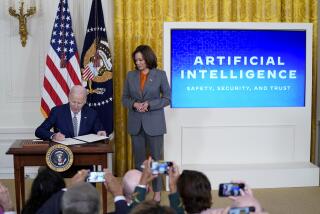Preying on the unwary with official-looking letters
- Share via
Luis Campos designs games. Not your app-happy, iPaddy, smartphoney games. Old-school board games and word puzzles.
Campos, 79, of North Hollywood figures he’s concocted more than 40 games over the years. Two of them are patented and trademarked (although not particularly well known). Another is awaiting patent and trademark approval.
So it wasn’t entirely a surprise for Campos to have received a letter the other day from United States Trademark Registration Office alerting him that a payment of $375 was due.
It was only after he picked his way through the fine print that Campos discovered United States Trademark Registration Office isn’t really a government agency and that it offers no guarantee it will actually do anything to protect Campos’ trademarks.
This is yet another example of how fast-buck-seeking businesses prey on the unwary with official-looking letters that offer a service you can typically do yourself for less or no money. Homeowners routinely receive such correspondence for “mortgage protection” or title searches.
The trademark letters now making the rounds represent a variation on the theme, targeting small businesses and entrepreneurs with a pitch that does little more than double the cost of an actual trademark registration.
“I’ve had more than 50 clients contact me to ask if the letter was real,” said Scott Kelley, a Woodland Hills patent attorney. “It seems to say that if you don’t pay the money, you’ll lose your trademark. That’s just not true.”
Deborah Cohn, the federal government’s commissioner for trademarks, told me that companies frequently scour official databases in search of trademark filings. They then contact the filer by letter or email with a solicitation for additional funds.
“These companies may use names that resemble the United States Patent and Trademark Office name, including, for example, the terms ‘United States’ or ‘U.S.,’ and require that fees be submitted,” she said.
Is it illegal? Apparently not as long as the correspondence spells out somewhere (usually in the fine print) that it’s not really a bill. Unfortunately, not everyone takes the time to ferret out such disclaimers, especially when the rest of the letter or email is bending over backward to appear legitimate.
In Campos’ case, his letter said United States Trademark Registration Office is on the 28th floor of the US Bank Tower in downtown Los Angeles. Pretty impressive, right?
I paid a visit to the US Bank Tower and — what do you know? — there’s no listing there for a United States Trademark Registration Office. But the 28th floor does have a company called Regent Business Centers, which rents work space to small firms.
A receptionist confirmed that United States Trademark Registration Office is one of the business center’s clients. She identified the head of the company as Hakob Manukyan.
Manukyan wasn’t around when I stopped by and didn’t return my subsequent calls for comment.
Apparently he’s not the first to have come up with a trademark racket. Last June, the World Intellectual Property Organization in Geneva issued a warning that “unscrupulous entities and individuals in various countries” are operating “fraudulent schemes” that prey on trademark holders.
“They have collected vast amounts of money from unsuspecting inventors and small businesses,” the organization said.
Kelley, the patent attorney, said it typically costs $275 to $325 to register a trademark with the U.S. Patent and Trademark Office.
Then you can maintain the trademark by using it and keep poachers at bay by running the occasional free search on the patent office’s website.
A close reading of the letter from United States Trademark Registration Office says that, for $375, it will record your trademark with the U.S. Customs and Border Protection bureau “to prevent the importation of goods that infringe registered trademarks.”
What it doesn’t say is that the actual cost of registering with the bureau is $190.
The letter also says United States Trademark Registration Office will “monitor your trademark” using the patent office’s free database and send reminder notices of future filing deadlines.
However, the fine print makes clear that “the responsibility is ultimately in the trademark owner’s hands” to safeguard his or her trademark, and that the company “makes no warranty whatsoever” that other people’s trademarks won’t be confused with yours.
In other words, you send us $375 and we’ll provide a service worth about half that amount and then make no guarantees about anything else.
Nice.
Campos said he had to study the letter long and hard before deciding it wasn’t the real deal.
“But I feel sorry for all the people who are paying these people almost $400 for something you can do on your own,” he said.
The patent office advises recipients of such letters to read them carefully to determine whether they’re legit.
“All official correspondence will be from the United States Patent and Trademark Office in Alexandria, Va.,” said Cohn. “And if by email, specifically from the domain ‘@uspto.gov.’ ”
The 28th floor of the US Bank Tower, not so much.
David Lazarus’ column runs Tuesdays and Fridays. He also can be seen daily on KTLA-TV Channel 5. Send your tips or feedback to david.lazarus@latimes.com.
More to Read
Inside the business of entertainment
The Wide Shot brings you news, analysis and insights on everything from streaming wars to production — and what it all means for the future.
You may occasionally receive promotional content from the Los Angeles Times.











